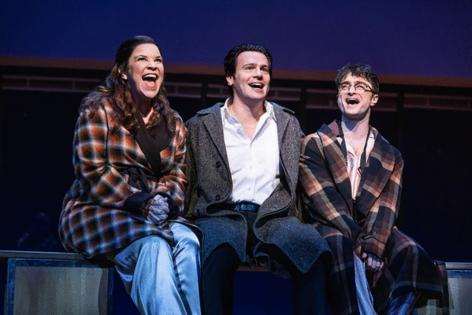Mary McNamara: Hollywood made friendship another unrealistic ideal. A Broadway hit finally smacks it down
Published in Entertainment News
In the first act of "Merrily We Roll Along," the Stephen Sondheim/George Furth musical currently enjoying a successful Broadway revival, the three main characters sing about the role old friends play in our lives. "Good friends," argues Frank (Jonathan Groff) "point out your lies, Whereas old friends live and let live." "Good friends like and advise," agrees Mary (Lindsay Mendez). "Whereas old friends love and forgive."
Charley (Daniel Radcliffe) also believes in the unique power of long-lasting friendship, but for him it serves another purpose — to remind each friend of who they truly are, or should be, even if they disagree.
And therein lies the crux, and the tension of the show. Based on a play by George S. Kaufman and Moss Hart, it is a reverse chronology of how a long, loving and fruitful friendship between three artists — Frank is a composer, Charley a lyricist and Mary a novelist — fell apart.
Spoiler alert: Hollywood is to blame. (I did mention that the show was on Broadway.)
Well, not Hollywood so much as success. Or a certain type of success. When the show opens, Frank is a big Hollywood producer being feted at his big Hollywood home. Mary is there, taking hilarious and increasingly drunken shots at the shallowness of the crowd (Kaufman and Hart were said to have based her on Dorothy Parker), but when Charley's name is mentioned Frank freezes. Years earlier, he and Charley created several successful Broadway hits; Charley is still writing plays but now they do not speak.
The personal cost of high-flying success is a ubiquitous theme in human storytelling, from Greek mythology (hello, Icarus) to "Succession." But "Merrily" is mostly about friendship — Charley tries to keep Frank true to his musical genius and youthful ideals despite Frank's obvious desire to chase money, power and glamour, and Mary bounces between them, desperate to protect the relationship itself.
More indelible than the pleasures of its performances or score, more incisive than its familiar assurance that being a rich Hollywood producer is, in fact, the worst, is "Merrily's" willingness to take a complicated view of friendship.
Frank's and Charley's very different definitions of what constitutes a friend offers an astringent alternative to our culture's sometimes treacly, overly simplistic portrayal of the bond. Even more than Broadway, Hollywood has fetishized friendship to the point that it's hard not to feel like a failure if you are not still devoted to every person you met in your teens or 20s decades later.
Romantic love may remain our most popular narrative, but adult friendship has become a very close second. Blocks away from New York's Theater District one can bask in the glories and re-created sets of "The Friends Experience," take the "Sex and the City" tour or (if you're up for a subway ride) have lunch in "Seinfeld's" Tom's Restaurant.
These shows, and their more contemporary counterparts like "New Girl," "Insecure" and even "Girls," offer a very different version of friendship from "Merrily." Following in the footsteps of "The Big Chill" and "St. Elmo's Fire," they project an image of unbreakable bonds formed during early adulthood that is every bit as romantic as any "happily ever after" love story.
...continued
©2024 Los Angeles Times. Visit latimes.com. Distributed by Tribune Content Agency, LLC.







Comments